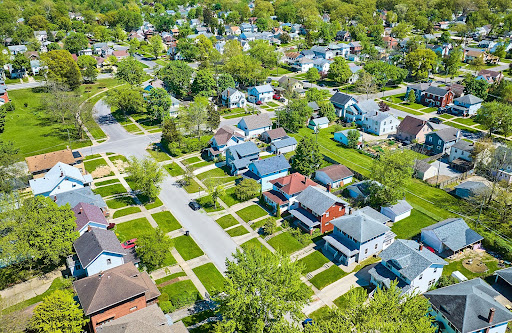What is HOA? Given the prevalence of these planned communities, buyers will undoubtedly encounter an HOA at least once during the search process. Only a few people know what an HOA is and what living in one entails.
What Is HOA? What Does HOA Stand For?
HOA is short for homeowners association, but what does HOA mean exactly? A homeowners association is a private entity consisting of members, i.e. homeowners, in a community. It is often organized as a nonprofit organization, though it does not receive the same tax benefits as a nonprofit organization recognized by the IRS.
What is a property owners association? A property owners association is similar to a homeowners association. It is a private organization of property owners that manages the community and maintains property values.
Every HOA or POA has a set of board members running the show. Homeowners choose these board members through an election process laid down by the association’s bylaws. Board members must serve the association and put its best interests first. The board is responsible for several things, including collecting dues, enforcing rules, and maintaining common areas.
A set of documents also governs every association. These documents dictate how an association should operate, the responsibilities of the association, and the obligations of homeowners, among other things.
The developer of a planned community typically forms a homeowners association. These communities can come in many forms, including condominiums, townhomes, and single-family homes. After some time or following the fulfillment of a condition, the developer transfers control of the HOA to the homeowners.
Can You Refuse to Join an HOA Community?
There are two types of membership in an HOA: voluntary and mandatory. In a voluntary association, homeowners can opt in or out of membership. They can choose not to join the HOA and be exempt from the obligations that come with it. Of course, this would also mean that they would receive different benefits than members of the HOA.
In mandatory associations, membership is compulsory. Homeowners who buy a house in the HOA community automatically become association members, with no way to opt out. Mandatory membership associations are the most prevalent, with voluntary associations being rare.
What Are HOA Fees?

Joining an HOA community comes with benefits, but it also comes with responsibilities. Homeowners who become members of an HOA must pay regular dues to the association.
What are HOA dues?
Simply put, HOA dues are fees that homeowners pay to the association as part of their member obligations. The association uses these fees for various expenses, including maintenance, insurance premiums, and repair costs. The board determines HOA fees by projecting the association’s expenses through an annual budget.
There is no standard amount when it comes to HOA fees. These fees can vary from one community to another and change depending on several factors. Location, the nature and number of common areas/amenities, and the size of the community are all factors that can influence HOA dues. Economic factors such as inflation and wages can also contribute to changing fees.
That being said, some states have laws that limit the association’s ability to raise dues annually. In California, for instance, the law prohibits HOAs from increasing regular fees by more than 20% of the preceding fiscal year’s fees without obtaining approval from the membership.
If an HOA maintains a reserve fund, a portion of the fees also goes into that account. The reserve fund plays a crucial role in preserving the financial health of an HOA. It is used to pay for major components’ repairs, replacements, and maintenance once they end their useful life.
However, not all associations have a reserve fund requirement. Members must check state laws and governing documents when determining whether an HOA requires a reserve fund. Even if no requirement exists, it is wise for an HOA to maintain a reserve fund.
The Pros and Cons of Homeowners Associations
Living in an HOA community has pros and cons as with most things in life. Understanding these pros and cons will help homebuyers decide whether HOA living suits them.
Benefits of HOA Living
Homeowners associations usually have common areas and amenities for residents. While these amenities vary, they usually include swimming pools, clubhouses, and gyms. Some even have private parks, playgrounds, and golf courses. Homeowners who live in HOAs gain access to these amenities and facilities, usually exclusive to community members.
Additionally, homeowners associations play an important role in enhancing curb appeal and protecting property values. They do this by enforcing strict rules concerning property use, architectural changes, and resident behavior. Homeowner dues also help maintain a high standard of living within the association.
Finally, living in an HOA offers a sense of community that is otherwise hard to achieve. Associations typically organize social gatherings and events that help bring neighbors together.
Drawbacks of HOA Living
Homeowners associations use fees and rules to help boost curb appeal and preserve property values. To some, though, these can be seen as drawbacks.
Members must pay HOA dues to the association, which is an added financial burden, especially for those who have to worry about mortgage or rent. Homeowners may not like the shackles of rules and regulations, as these tell them what they can and can’t do with their homes.
Furthermore, if an association is poorly managed, everyone in the community suffers. As such, it is important to elect competent leaders or enlist the help of an HOA management company.
What Is HOA? Explained!
It is critical to know what a homeowners association is before deciding to buy into one. These associations offer many benefits, but they can also be limiting and demanding. Buyers should keep in mind, though, that the obligations with HOA living will benefit them in the long run. Still, buyers should look for homes elsewhere if fees and rules are non-negotiables.
Managing an HOA is an uphill battle. Fortunately, First Equity Property Management can help. Call us today at 650.349.7233 or contact us online to learn more!

